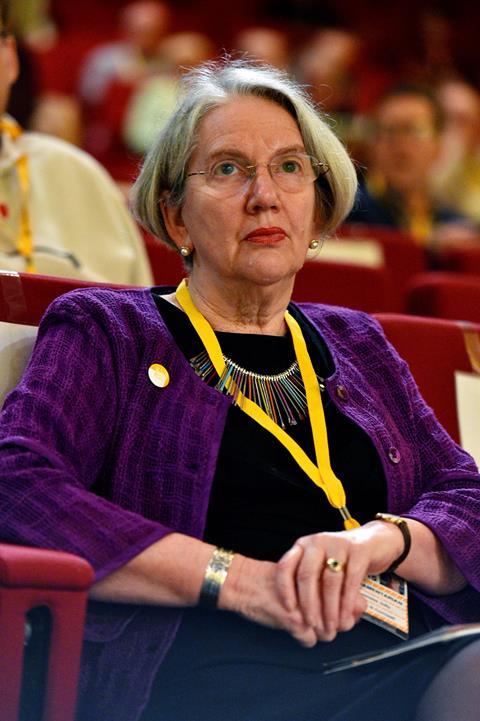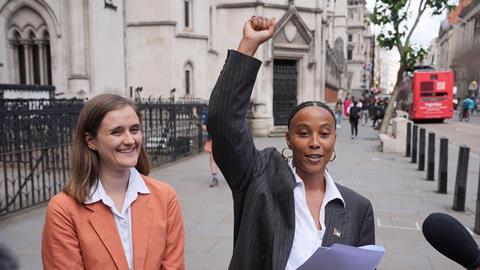There is an urgent need for direct and comprehensive regulation of counsellors, therapists and ‘complementary practitioners’, argue Malcolm Johnson and Richard Reid
Last year’s case of a therapist, Michael Lousada, who was successfully sued by a patient for sexual abuse, demonstrates the dangers that abound in the therapeutic community. The case underscores the urgent need to effectively regulate therapists in the UK. Lousada (pictured below), who opened his first ‘sexual wellness clinic’ in 2016 at a private hospital, used sexual penetration as a ‘therapeutic technique’. His patient, Ella Janneh, reported his abuse to the police. However, as is often the case, the Crown Prosecution Service declined to prosecute. Consequently, she bravely took him to civil court, waived her anonymity and won substantial damages. Janneh was a survivor of childhood abuse. She approached Lousada after suffering panic attacks during consensual intercourse. The judge in her case stated that he had ‘no doubt’ Janneh ‘entirely lacked capacity’ to consent to what took place.

More recently we have the appalling case of alternative healer Hongchi Xiao. He was sentenced to 10 years’ imprisonment for manslaughter by gross negligence of a 71-year-old diabetic woman who stopped taking insulin at his slapping therapy workshop. His patient, Danielle Carr-Gomm, died in 2016 while taking part in the Paida Lajin therapy event. This sees patients being slapped or slapping themselves repeatedly.
Reports of therapy being used for abusive or inappropriate purposes have a long history. In 1991, a former social worker, Frank Beck, whom Leicestershire Social Services had employed, was convicted of abusing around 100 children in his care. It emerged that he used his brand of ‘regression therapy’ as a means of abusing children. This involved getting children to act out a state of infancy. He would also provoke children into rages under the pretext of letting their emotions out so that they could be physically restrained. The life sentences handed down to Frank Beck illustrate the full horror of his career.
There have also been many instances of cults (religious or otherwise) whose self-styled ‘therapists’ or ‘counsellors’ employ insidious mind control techniques to achieve pliancy among members. This is sometimes referred to as ‘spiritual abuse’ in the religious context. An extreme example can be seen in the shocking violence meted out by John Smyth, an officer of the now defunct Iwerne Trust, to young members who were told that they were ‘bleeding for Jesus’. The involvement of the Archbishop of Canterbury Justin Welby in the Iwerne Trust and his failure to investigate Smyth led to his recent resignation.
We also have the issue of ‘conversion therapy’, which has been offered to those seeking help for unwanted same-sex attraction. More extreme forms of this therapy can include exorcism, physical violence and food deprivation. The British Psychological Society and other professional bodies, including NHS England, have warned that all types of conversion therapy are ‘unethical and potentially harmful’. The Labour government recently announced plans to introduce a Conversion Practices Bill to ban practices aimed at changing or suppressing someone’s gender identity or sexual orientation in England and Wales.

Questions arise regarding the efficacy of certain types of counselling or therapy. From a medico-legal point of view, any lawyer who has instructed a psychiatrist in an injury claim knows that some psychiatrists doubt the value of particular treatment regimes. It is not uncommon for defendant insurers to ask whether the claimant is serious about pursuing that regime once damages are paid. There are also questions raised within the therapeutic community about the dangers of patients becoming dependent on treatment without achieving any improvement in their mental health.
In our experience, professionally and practically delivered therapy can and does make a real difference in a traumatised person’s ability to cope with life’s challenges, mainly if delivered promptly. However, the problem lies in finding the right professional to provide the necessary mental health treatment. This is extremely difficult when there is a bewildering array of treatments available.
The above cases do not definitively indicate that a specific type of therapy or counselling is suspect. Individual therapists use various therapeutic approaches depending on a patient’s issue. A helpful ‘A to Z’ list can be found on the British Association for Counselling and Psychotherapy (BACP) website. This includes better-known types of therapy, such as cognitive behavioural therapy and eye movement desensitization and reprocessing, which lawyers often see recommended by psychiatrists in medico-legal reports.
So, how are counsellors/therapists or ‘complementary practitioners’, as they are sometimes known, regulated? The brief answer is that, unlike other health professionals such as doctors and nurses, there is no direct regulation by the government nor any legal bar preventing a person from giving themselves the title of counsellor/therapist and setting up a practice.
Successive governments have taken an indirect voluntary regulation approach administered via private organisations.
The largest is the BACP, a registered charity founded in 1977. It aims to raise professional standards and support ethical and competent practice among its members. The BACP has around 60,000 members, composed of individual practitioners and organisations. Registered members must have ‘demonstrated high standards of proficiency, professionalism, and ethical practice’, and they are required to have graduated from a BACP-accredited course or passed the BACP’s certificate of proficiency. The BACP’s register is accredited under the Professional Standards Authority (PSA) for Health and Social Care’s accredited register programme, which will be discussed below. The BACP has a professional conduct procedure to investigate any complaints brought by the public. Decisions to suspend are published on its website.
The UK Council for Psychotherapy (UKCP) was established as a registered charity in 1993. It has around 8,000 members who are required to train every year, maintaining a code of ethics. Like the BACP, the UKCP’s register is accredited by the PSA and it can investigate complaints against members. Decisions related to complaints are also published on its website.
The British Psychoanalytic Council (BPC) is a charity established in 1992. It is the leading professional association for the psychoanalytic profession, registering psychoanalytic and psychodynamic psychotherapists. Its membership consists of around 2,000 individual practitioners and several more minor associations, and its register is accredited with the PSA. It has a ‘fitness to practise’ procedure and publishes outcomes in individual cases.
Decisions found on the BACP, UKCP and BPC websites regarding misconduct include breach of confidentiality, failing to declare a previous dismissal from employment due to misconduct, and sexual activity with a client.
It should be noted that psychotherapists and counsellors who are members of these organisations provide a wide variety of services to the National Health Service, other public authorities, the voluntary sector and the public on a private basis.
However, with all these different organisations, it is unsurprising that the public finds the current psychotherapy/counselling landscape and its regulation confusing. The BACP, UKCP and BPC have worked with three other psychotherapy/counselling organisations for several years on a project called Scope of Practice and Education (SCoPED). The idea is to produce a common framework for the education and training of their members. In January 2023, all project partners agreed to adopt that framework. The transition began in February 2024 and will end in early 2026.
Regarding direct government regulation, attempts to introduce a statutory system for psychotherapy and counselling date back to the 1970s. But all have so far failed. One problem (according to the UKCP website) was the lack of agreement among the bodies to reach a consensus on founding a standard register of practitioners and training requirements. In 2011, the government announced that instead of imposing a statutory regulation system on practitioners, there would be a system of voluntary-assured regulation overseen by the PSA.
The Health and Care Professions Council acts as an umbrella regulator for various medical professions, all having titles protected by law. These include arts therapists, speech and language therapists, and practitioner psychologists but not psychotherapists and counsellors, who remain ‘unregulated’ except by organisations such as the BACP. The PSA accredits the BACP, UKCP, BPC and other organisations offering psychotherapy and counselling, including the three partners in the SCoPED project: the Association of Christians in Counselling and Linked Professions, the Human Givens Institute, and the National Counselling and Psychotherapy Society. The other organisations accredited by the PSA that are not part of the SCoPED project include the Association of Child Psychotherapists, the British Association of Play Therapists and the National Hypnotherapy Society.
In March 2020, the House of Lords debated the issue of statutory regulation, asking the government what assessment had been made of the impact of treatment by unregulated and unregistered persons offering psychotherapy or counselling services on their clients’ mental health and wellbeing. During the debate, Baroness Judith Jolly pointed to the example of a BBC journalist who had recently obtained a counsellor qualification certificate online for £12.99. She also noted that it was up to the patient, not the provider, to check on their counsellor/therapist.
Meanwhile, waiting lists for NHS-funded mental health services were long and patients were turning to private healthcare solutions. Certain types of online treatment, where there was little accountability for any harm caused, made it easier for patients to be exploited, especially where such harmful treatments were sold through slick marketing and glossy brochures.
Baroness Jolly stated: ‘Without protecting these terms [psychotherapists/counsellors], we leave the profession open to abuse by those practising pseudoscientific therapies, potentially causing harm to their clients.’ In the meantime, patients said the process of reporting harm through voluntary regulatory bodies could be long and arduous.
Other speakers noted that while the statutory regulation of different healthcare professions had become stricter, this sector remained a ‘wild west frontier’. There was also a comment on the easy availability of courses offering ‘accreditation’ outside the rigorous requirements of bodies accredited with the PSA.
Thus, we find a situation where it is not illegal for anyone to call themselves a psychotherapist or counsellor and start offering services to the public. This includes those previously struck off by the BACP, UKCP and BPC. Even if these regulatory bodies strike off a practitioner for misconduct, there is no legal requirement for that individual to stop practising, regardless of serious allegations, including sexual misconduct. The PSA has requested that the government amend the Rehabilitation of Offenders Act 1974 and the Safeguarding Vulnerable Groups Act 2006, so that those statutes would cover all individuals on accredited registers. However, no amendments have been made to these statutes to date and the government’s response to the 2020 debate indicated that it had no plans to change existing laws. The reasoning was partly based on the diversity of therapy treatments available and the difficulty in regulating that diversity.

Nonetheless, the dangers of failing to regulate are illustrated in the Lousada case. Despite losing the civil case against him, there is nothing to restrict him from continuing to practise, although he claims not to have treated anyone since he was sued. What is known from the court’s judgment is that Lousada attempted to establish his professional body, the Association of Somatic and Integrative Sexologists, with its ethical codes, and he previously spoke about working in the NHS. One initial safeguard could be to make coercion within therapy a criminal act. In the 2020 Lords debate, section 76 of the Serious Crime Act 2015 was mentioned. This outlaws ‘controlling or coercive behaviour in an intimate or family relationship’. The problem for a person accusing a therapist/counsellor of such behaviour is that the offence can only be committed in restricted situations – that is, between couples, people in ‘intimate personal relationships’, and relatives. At present, there are no plans to widen the scope of the section.
There is some validity to the government’s 2020 response that there are too many types of therapists/counsellors to regulate effectively. However, all medicine is extraordinarily diverse. The issue lies in preventing rogue therapists/counsellors from harming the public by requiring anyone claiming to belong to those professions to possess the requisite qualifications and undergo necessary checks. It must be in the government’s interest to ensure that the delivery of mental health treatment in this country is as effective as possible, especially given the increase in claims for benefits due to mental illness.
Considering the troubling circumstances surrounding the regulation of therapeutic practices, immediate action is required to protect vulnerable individuals seeking mental health support. The case of
Lousada not only highlights the dangers inherent in unregulated therapy but also emphasises the critical need for a unified regulatory framework that can ensure consistency, accountability and safety in the profession.
As discussions continue regarding establishing statutory regulations, it is essential for all stakeholders – including government bodies, therapy organisations and the public – to advocate for meaningful change. Improving public awareness of the qualifications and standards expected of therapy providers is crucial, as is promoting the necessity of rigorous training and ethical practices within the field.
By striving for greater regulation and transparency in the sector, we can foster an environment where individuals seeking help can confidently do so, knowing that robust professional standards safeguard their wellbeing. The forthcoming debates regarding proposed legislative actions, such as the Conversion Practices Bill, may catalyse broader discussions on the need for comprehensive regulation in all aspects of therapy.
Malcolm Johnson is the head of the abuse compensation claims department at Lime Solicitors, London. Richard Reid is the founder of Pinnacle Therapy. He has worked for over two decades as a psychology expert, coach, media spokesperson, keynote psychology speaker, and author
































1 Reader's comment